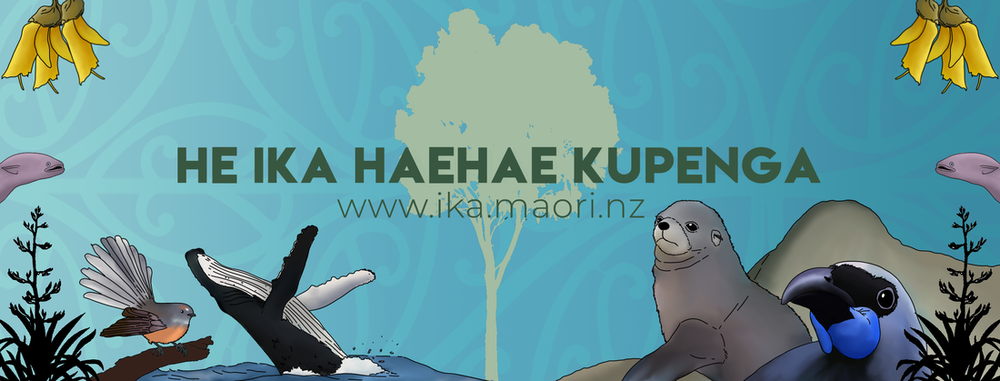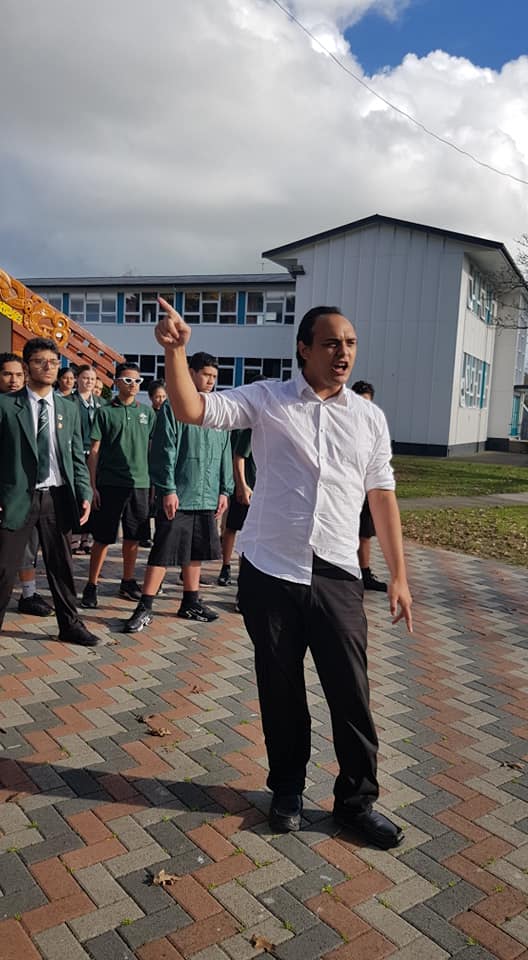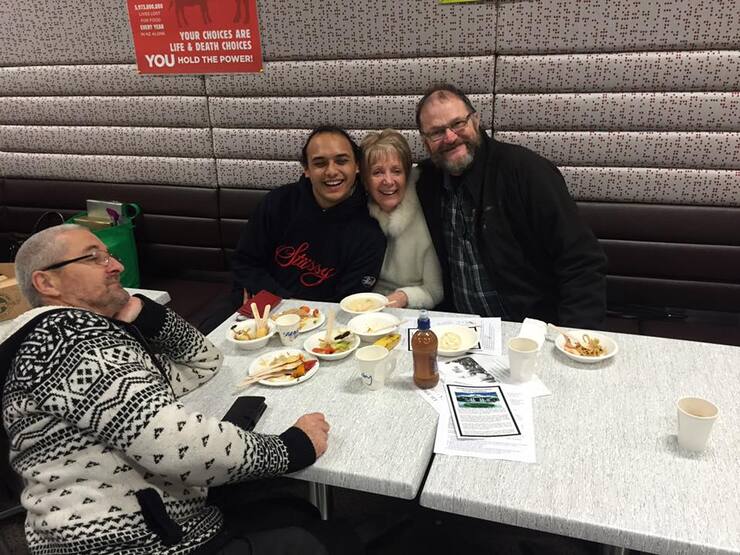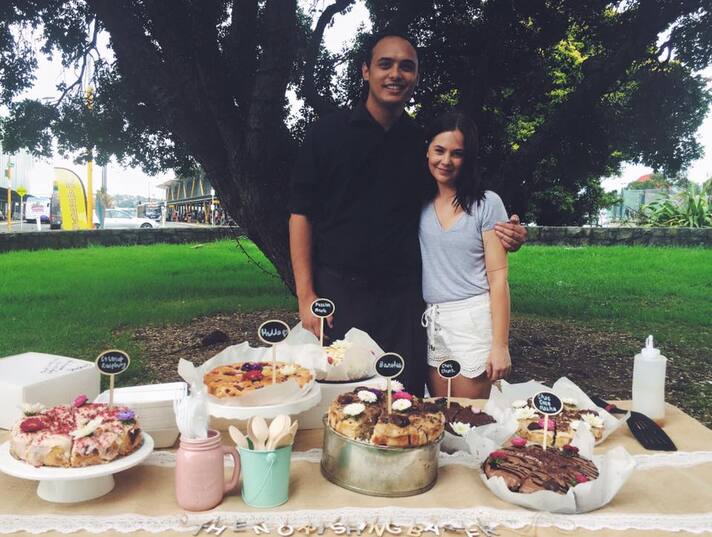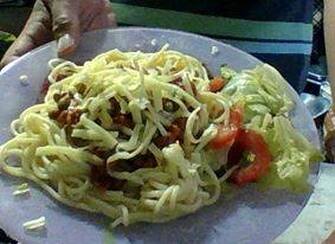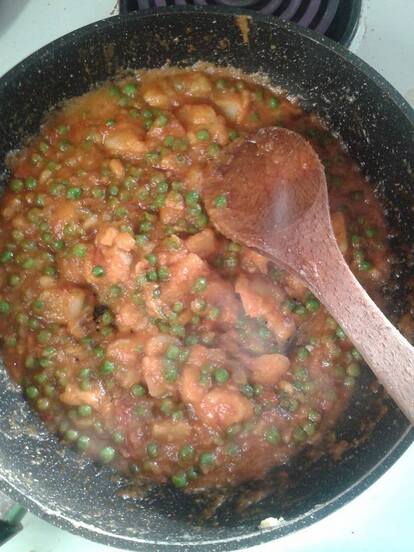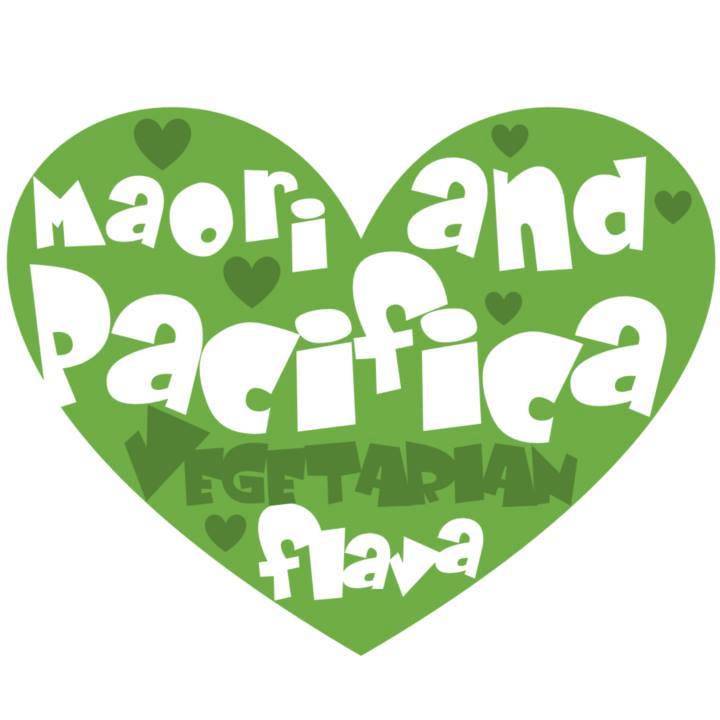Te Rata Hikairo
interview with Philip McKibbin
Te Rata Hikairo (Ngāpuhi) is a kaiako, former politician, and activist. He established Corned Buffet, a Facebook page which supports Māori and Pasifika to transition to plant-based diets. A kaimanga himself, he is a passionate supporter of plant-based initiatives.
|
When did you go vegan, and why did you make the transition?
I went vegan in 2015. The transition was for both my own health, and the health of Papatūānuku and te taiao.
Immediately, people notice things like weight loss – that was some of the immediate stuff. But because I’m not a big drinker and I don’t smoke, there’s all of that other stuff that had a positive impact on my health. So, weight loss is a big one, and better toned.
I haven’t always, consistently over the years, stayed on the waka. That’s another thing to remember. So I have to go to the times that I was really on the waka, and on the kaupapa. But yeah, when I’m on the kaupapa, weight loss was one big one.
It was interesting with this whole thing around the climate strikes and all of that. I posted in a few different places. I said, ‘Yep, ka pai. I know there’s gonna be lots of people that are gonna be marching, but then what about what you can do afterwards?’ Immediately, top of the list, there’s being vegan. Why? Because of farm production. Food production, particularly animal-based foods, has a really negative impact on the planet, in terms of things like greenhouse gasses and all of that. So, it’s kind of a natural progression to wanting to take care of the planet, but also just in terms of the seas, right? Like, one of the big things is the plastic going into the seas, and that again comes from food packaging.
|
But more basic than that, all of the ika that get taken from the moana – that, by the way, aren’t really that healthy because they’re filled with mercury, right? We’re making a positive impact on the sea when we stop eating fish, particularly when the fish stocks are being depleted. We’re making a positive impact on the land when we stop eating land animals, because the intensification of farming has a really bad impact on the land. And, again, greenhouse gasses from beef production is astronomical. And the fact that we’re losing the Amazon mainly to cattle grazing for McDonald’s and Burger King.
What connections can be made between veganism and mātauranga Māori?
The kaupapa about kai and respecting Tāne, Rongo-mā-Tāne, Haumia-tiketike, Tangaroa, Papatūānuku, and Rangi-nui. This is very much Kaupapa Maori. Veganism helps Rangi and Papa by impacting climate change, it honours Tangaroa by taking care of the sea and its resources, and the same for Rongo-mā-Tāne, Tāne-mahuta and Haumia-tiketike.
Our tīpuna ate birds, fish, shellfish, et cetera, and that was at a time when we had massive stocks, and there was a way that we could easily control resources, and we weren’t raping resources and destroying them and depleting them. It’s easier to talk about things from a religious perspective than from a cultural perspective – you know, there’s no, ‘You must eat this.’ in te ao Māori. There’s no rule that, ‘You must eat this, you must eat this.’ It’s, ‘That it is available, and it is possible to eat it.’ That’s very different to ‘To be Māori, you must each such and so.’ But yeah, our tīpuna ate everything, and again that was at a time before colonisation and commercialisation and capitalism destroyed the resources of the world.
In the past, you've spoken about rāhui. How does this concept relate to veganism?
There are ways to honour atua Māori, to honour the resources they give, and to protect the Earth and Sea. These ways are numerous. Rāhui is one way available to us quickly ensure that we allow resources to self-replenish.
Rāhui is a Māori cultural concept, and it’s about the preservation and replenishing of resources, essentially. It’s a concept that we have in te ao Māori to replenish resources – to allow animal resources, plant resources, whatever kind of resources, to replenish, so that they can be used again in the future if so needed. If it was deemed that those resources would be needed again, you’d give them time to replenish. So that’s what rāhui is.
If we were really pro-te taiao and pro-whakaaro Māori, in terms of looking after Papatūānuku and Ranginui, then the natural intellectual progression for te ao Māori would be, ‘Let’s rāhui a whole lot of animal-based products, all of them.’ If we were really true to what it meant to be tiaki o te taiao and be kaitiaki of Ranginui and Papatūānuku – if we really did view ourselves as kaitiaki of the Earth, kaitiaki of the Sea, kaitiaki of the Heavens, kaitiaki of the Land – then we would rāhui a whole lot of products, rāhui a whole lot of animals, a whole lot of fishes, a whole lot of birds. We’d rāhui the lot, because we know that not just in Aotearoa but in the whole world – but particularly in Aotearoa – there’s so many resources that are pretty much depleted, and there are so, so many of our species that are just extinct since colonisation. If we came from the point of view of trying to save them so that they could survive, we’d rāhui all of them, but it would not seem that we’re thinking in that way. And just like every other culture, we’re just as colonised and capitalist as any other culture in the world. If we were really serious about it, we’d rāhui the lot – but we’re not, as a people.
If we were on the waka of tiaki i te taiao as a planet, right – not just as one country, but as a planet – of tiaki i te taiao and a plant-based diet – there wouldn’t be a point again in the future where animal-based diets would make sense. If it was something the whole planet was doing, it would not make sense. In pre-Mughal India, the whole population was vegetarian; and when the Mughals dominated India, they started to eat meat. But you still have massive, massive chunks of India – millions, millions of Indians – that are vegetarian, even vegan, and for those people it makes no sense at all to introduce animals into their diet, even though there are millions of meat-eaters in India, too. So yeah, if that was on a global scale where everyone was vegan, it would not make sense to have animals as part of our diet. Even if the whole world went vegan, it would probably take 100 or 200 years, maybe 300 years, to replenish our resources at such a time where it would be okay to use those animal-based resources again, so it wouldn’t make sense anymore – in my opinion. That’s all speaking from the hypothetical.
Some Māori argue that 'vegan' is a problematic Pākehā label. What are your thoughts on this?
I agree, but only from a reo point of view. Other words I like are 'kaimanga' or even 'kaitiaki'.
|
Kaimanga is a borrowed term from some of my other reo Māori speakers. I asked reo Māori speakers, ‘What’s the appropriate term?’ And they said, ‘Kaimanga’, like vegetarian, like you mainly eat – it’s literally ‘fruits from the branch,’ or ‘food from the branch,’ so foods that grow. So ‘kaimanga’ is a term that I’m really comfortable with. I am actually comfortable with ‘vegan’. I this modern ao hurihuri, myself, I can be comfortable with ‘vegan,’ but I understand why people wouldn’t be, and it totally makes sense that it is a Pākehā whakaaro.
|
One of the things that really worried me and that kind of made it hard – that whole thing about staying on the waka, right? – is that a lot of online spaces that are for vegans are dominated by people that don’t understand our worldview and don’t understand our whakaaro, and so particularly for new vegans, people who have been vegan for a long time jumping down the throat of someone who didn’t know this or this about honey, or this or this about cotton, or whatever it might be, and the levels of veganism – ‘Are you a Level 10 vegan?’ ‘Are you a Level 1 vegan?’ And, you know, ‘You’re not really vegan if this, this, this.’ And that is so, so isolating for people that are already doing something that’s really quite different to the norm as a Māori – so, particularly for a Māori that’s doing something that’s already quite different to what other Māori would be doing. When you go into that space, and people who have been vegan for a long time – particularly Pākehā – who say that you’re wrong or bad because you’re not doing everything that they do, these people that have been established vegans for a long time, when we take it on for ourselves, we have to carve out our own tikanga and our own whakaaro about it.
I like the word ‘kaitiaki’, as well, a person that is a protector of the Earth, has a diet that correlates to being a protector of the Earth. So yeah, ‘kaitiaki’ is really good. As someone who is a protector of the Earth, your life and lifestyle and your diet is consistent with being a protector of the Earth.
What’s your favourite vegan meal for sharing with non-vegan friends – those who might be sceptical about veganism?
|
No, there isn’t. There isn’t a favourite ‘You must eat this.’ If you introduce vegan food to any vegan people, it obviously needs to be more than a salad, right? But if you, for example, took foods that they are familiar with – say, a burger, or chips – things that they eat anyway, those kind of things, or a stew or a soup or a pasta dish or whatever... whatever it is, something that we know that non-vegans or omnis will eat a lot of, and say, ‘Well, by the way, that’s actually vegan,’ they’ll jump out of their skin! And then they’ll be like, ‘Oh, wow, this is delicious.’ Like, ‘Yeah, course it is!’
When I was quite new and going to things like vegan potlucks, and just being so excited, because there were certain preparations and certain foods that I would do, and realising, no, you can literally do anything – almost anything. Now, you have to be more concerted and plan it better, cos you can’t just chuck anything together, but it just requires preparation. But you can have anything! There’s a vegan alternative for everything.
|
But yeah, burgers and chips – you can’t go further than burgers and chips, and that kind of stuff. Or even pasta dishes, lasagne, whatever. My favourite is Burger Fuel. Burger Fuel’s vegan options – their soy shake, their vegan burgers, and their chips cooked in vegetable oils.
As a kaiako, what strategies do you use to help tamariki make connections around kai, te taiao, and hauora?
Great question. In our curriculum, we have the Health Curriculum. There are the nutrition strands too. But more basic then this is ongoing conversations about healthy eating, healthy choices. The difficulty is that their diets – while schools can regulate what’s eaten at school- are mainly a reflection of what their whānau provides. And so what we also would need to do is impact diets at home through learning and teaching.
From what I’ve seen of the more advanced stuff in Health – so, I’m talking about Level 1, Level 2 NCEA, and things like Health Science and PE Science – there’s a whole lot of stuff that you can do around healthy lifestyles. I haven’t actually read in depth about it, but I remember when I was doing some of this with the students – actually, another teacher had set it and I did the relief work – and I was like, ‘Wow! There’s a whole lot of stuff around veganism, vegetarianism…’ I think it was NCEA Level 1, so that kind of level, where students were researching about different kinds of diets, and their impacts on health.
The thing about our curriculum is that it’s really broad and open and it has these ambiguous statements, and then it’s up to the teacher to interpret and say, ‘Okay, well, you can teach this, or you can teach that.’ It’s hard, cos I’m an English teacher and Social Studies teacher. It’s really hard to. It’s not one of those explicitly taught things. It’s more like at lunchtime, having kids go, ‘What are you eating?’, ‘Oh, what are you eating?’, and that kind of thing. It might not be part of the curriculum teaching so much as having a discussion about kai, or it might be a shared kai – ‘Oh, well, I’m bringing this.’ It’s kids, so they’re like, ‘Oh well, kai is kai.’ They don’t actually have a concept of, ‘This kai is different to that kai.’
What actions, if any, do you think our government should be taking around kai?
|
I support the transition to a more green economy, in particular in helping farmers to focus more on environmentally-sustainable farms. I also think we need to ramp up the māra kai kaupapa. One thing we don’t have enough of is health research, health information campaigns, et cetera. We used to have the 5+ a day, et cetera, but not these days. We need to bring that back.
I don’t know what’s happening now, but I know that under the last government there was a big fund available for community gardens. I don’t know if the funding’s still available. But certainly, that’s the conversation that needs to be a lot bigger than what it is, cos I tell you, we would not be spending $10 billion on health if there was a big thing around gardening and a big thing around healthy eating. And the fact is, no, we do spend $10 billion on health, because there’s all these food-based diseases that actually cause certain corporate interests to turn a profit. But actually, if the New Zealand government and others were smart about it, we’d invest billions of dollars into reforming our food production, our community-based gardens, our whole conversation. It wouldn’t just be advertising campaigns.
|
What would your advice be to tāngata Māori and whānau Māori who want to give veganism a go, but aren't sure where to start?
|
My Facebook page, Corned Buffet, is a great start for them. As is Raniera Rewiri's @PlantBasedMaori. Those are great tools.
Corned Buffet is a vegetarian page. It’s an online space that has photos, articles, and recipes. There’s as much vegetarian food as there is vegan food on there. It’s for the transitioning people, really. It was a space for Māori and Pacific people to see foods that they’re familiar with, foods that they love, being veganised, or, you know, you cut the meat out, or you make it vegetarian. And it was a way of shifting the conversation from meat-based food to plant-based food, in a way that was comfortable for Māori and Pacific people.
|
People ask, ‘What’s the link?’, or ‘Can I get this?’, or, ‘How do I find out more about it?’ They’re really hungry. They’re really hungry for it, they love it. My whānau, my friends, the other people who were working on it with me, people love it, and they see it, and they think the food is delicious, and all I say is, ‘Go try it! Make it for yourself. You’ll love it.’ I enjoyed it. I’m less active on it now, but it was really fun, cos I did a lot of, ‘Here’s my dinner tonight,’ or ‘Here’s my lunch,’ or ‘I found this local place, and you can go here.’ It was fun to do.
But yeah, do the research, look at what works for you. Do not rush your transition. Long-term sustainability of this diet means that we actually need to slowly embed it so that it is also fun and enjoyable rather than forced. Do not, do not, blame yourself for falling of the waka. Ease back on and remind yourself why we do this.
Don’t beat yourself up. Do not beat yourself up for falling off the waka, or for not knowing – or whatever. And also, don’t get incredibly attached to, ‘You have to get it right straight away,’ and, ‘You always have to keep doing it right’, cos it’s a painful experience, and it’s a socially isolating experience, cos the places where we eat, the places where we shop, the places where we interact, the places where we do things socially, how we interact socially – and I’m talking about Māori and Pacific people – it’s a really big adaption. It’s a really big adaption. In some cases, when you go to the marae as a Māori person and if you’re a vegan, you have to cook your own kai. Now, many marae don’t have an issue with that. Some might. So, yeah, be gentle with yourself if this is the lifestyle you’re transitioning into. And be understanding of others who don’t understand, and be open to share, and to share your why and to share your reason. Cos when you go from this activist, kind of, ‘Non-vegans are bad!’ to ‘I’m vegan because of…’ or, ‘I eat this kai because…’, people are a lot more open. They’re like, ‘Oh, wow, that’s that thing that you do. Cool!’ And they’re a lot more prone to tautoko you when you talk about the good of why you do this, versus how bad they are because they don’t.
That’s the one point that I want to hammer, is that the way that veganism is going to have a better impact is not by telling people how bad they are because they’re not vegan, but by showing people the goodness of the vegan or the kaitiaki lifestyle. We are gonna win over a lot more people if we show them how good this is versus how bad they are because they haven’t jumped on the waka yet.
Many of us have watched all those documentaries, and that’s shockingly horrible – and it’s the truth. But I tell you, it’s just not palatable for wide audiences, and many audiences are not even gonna look at it, cos they already know it’s horrible. But if you say, ‘Well, I just had this avocado enchilada and it was vegan,’ they’ll be like, ‘Oh, true? Can I have some?’ Or, ‘I had this vegan burger. The pattie was juicy as.’ ‘Oh, what?!’ Or, ‘I just made this lasagne.’ ‘Oh, what do you have in it?’ ‘You know, mushrooms, and beans, tomato-based sauces, and my white sauce was vegan, and it was yum.’ ‘Wow! Really? That’s so creative!’ People are way more keen for that than ‘You are bad because you eat dairy!’
I believe in you. Our atua Māori need you to do this. Kia kaimanga!
Interviewed: September, 2019
Published: January, 2020
Published: January, 2020
